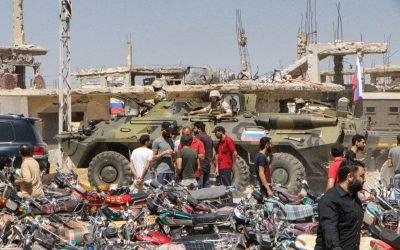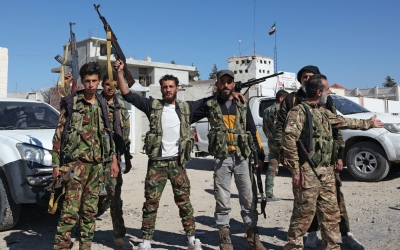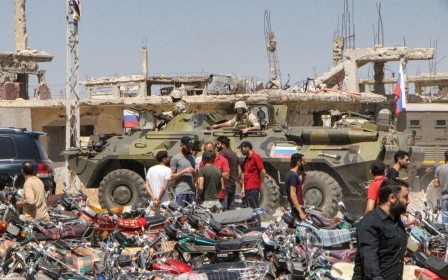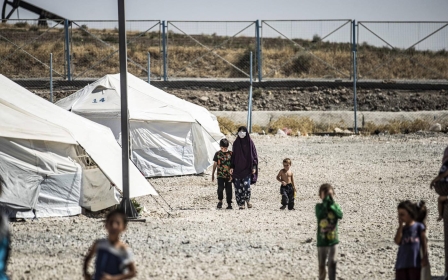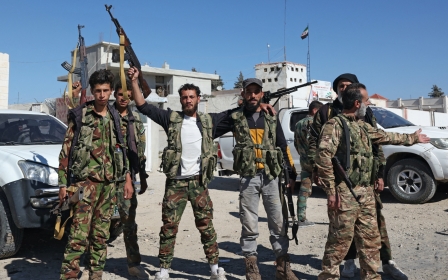Syria: Disputed house blast fuels accusations and deadly fighting in Daraa
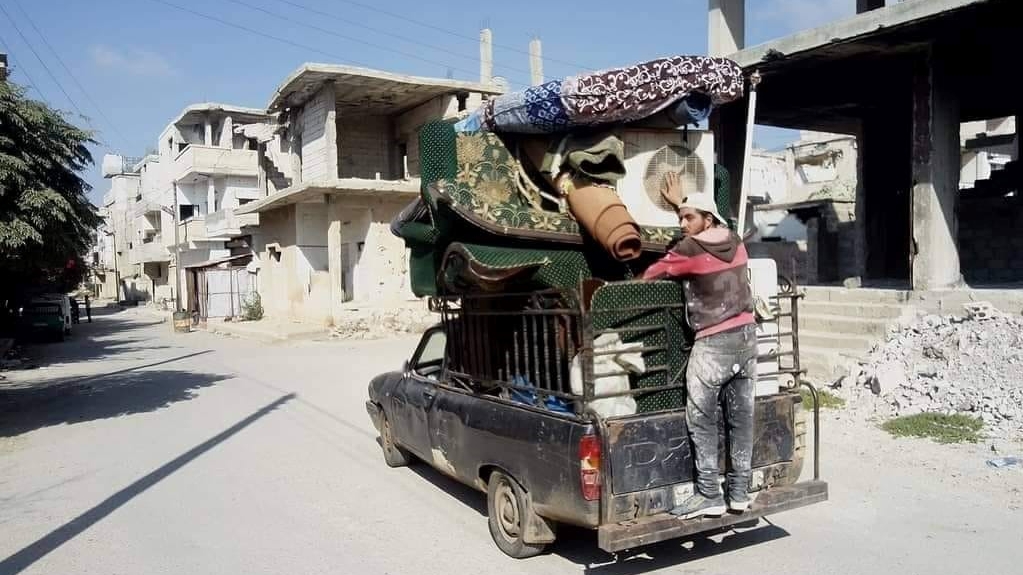
Four days of bloody local fighting in the government-held city of Daraa in southern Syria have left six people dead, including a child, according to local media and the Syrian Network for Human Rights.
Dozens of families who were stranded during the clashes have now left the city after a temporary ceasefire, according to local media, amid calls for an end to the fighting between groups allegedly affiliated with Islamic State (IS) and the state-backed 8th Brigade.
Fighting began in the poorly-secured city on Monday, a few days after an alleged IS member suspected of being harboured by local rebels reportedly blew himself up on Friday at the home of Ghassan Akram Abazid, a former rebel leader in the city.
'I am not interested in them being described as IS or anything else, but they are a criminal gang, bandits, assassins, and murderers'
- Ahmed Bayazid, senior figure in Daraa
Abazid was wounded and four other people were killed in the explosion.
Local military security groups, led by former rebels, then launched an attack on rebels allegedly harbouring IS elements.
New MEE newsletter: Jerusalem Dispatch
Sign up to get the latest insights and analysis on Israel-Palestine, alongside Turkey Unpacked and other MEE newsletters
Hours later, the Syrian army's 5th Corps' 8th Brigade deployed heavy weapons to support the local military security groups.
The 8th Brigade is made up of former rebels who reconciled with the government following its takeover of Daraa from the opposition in 2018.
Russian support for the brigade was cut off last year, and the brigade now receives support from the notorious Syrian military security apparatus.
Tensions had increased after Abazid appeared bloodied in a video clip at a hospital, saying that he had seen the suicide bomber before he blew himself up, describing him as a displaced person from south of Damascus.
Abazid, who vowed revenge for the blast, said the man belonged to the eponymous Moid al-Masalmah group, a rebel group that has been accused, without evidence, of having links with IS
'They're liars'
In an audio clip that went viral on social media, Masalmah denied Abazid's claims, vowing to resist the attack launched by the 8th Brigade against his group, during which he has so far lost several fighters.
Masalmah also denied that the explosion at the house was a suicide, or an IS act, and accused those in the house at the time of the blast, including Abazid, of being affiliated with the local military security, adding that they had tried to target him with a bomb last year.
Meanwhile, the displaced man who Abazid had claimed to have seen blown himself up in the house appeared in a video, denying Abazid's accusation.
So far, IS's Amaq News Agency has also not claimed responsibility for the attack, which it normally does for all its operations.
In another audio clip circulated on local media, Muayyad Harfoush, a second rebel commander against whom the 8th Brigade is carrying out attacks, also denied allegations he was associated with IS, or took responsibility for the explosion at the house.
Harfoush and Masalmeh are among those most wanted by Syrian intelligence.
Last year, government forces, backed by Iran, launched a military operation in Daraa in an attempt to force them out of the area towards northern Syria, which is under the control of the Turkish-backed opposition.
"They're liars, they were making explosives and one of them exploded during the manufacturing," said Harfoush in the clip.
"If we acquiesce to reconciliation [with the state] and Iran's entry into the region we are accused of being IS...
"Their goal is to get rid of groups that have not reconciled... History records everything, we are capable of resistance and if we die, we will die with dignity," he added.
Claims government facilitated the entry of IS
In response to the audio clips, Ahmed Bayazid, a senior figure in Daraa who was previously a member of a local committee facilitating reconciliation between the rebels and the government, posted a video clip claiming both Masalma and Harfush were responsible for the explosion and supporting the attacks on the groups by the 8th Brigade.
"I am not interested in them being described as IS or anything else, but they are a criminal gang, bandits, assassins, and murderers..." said Bayazid, whose relative was injured in the house blast, in the video.
Amer Al-Hawarani, a spokesperson for the Horan Free League, a citizen journalism platform based in Jordan, which published Bayazid's video, told Middle East Eye that Syrian authorities had contributed to the growth of IS in the region.
In several of its reports, the Horan Free League said that Louay Al-Ali, the head of the military security branch in Daraa, had facilitated the entry of IS elements into the area.
"There are local fighters influenced by the IS's ideas, and the military security has turned a blind eye to the infiltration of IS elements from the Badia region in eastern Syria, and the Yarmouk Basin in Quneitra province, to Daraa, to fuel local conflicts," said Hawarani.
"Military security aims to kill the largest possible number of former rebels, whether they made reconciliation [with the government] or not, as they posed a previous threat to the government.
"Not all of the 8th Brigade is loyal to the military security and not all of them reconciled with the government, and at the same time there are rebel leaders and elements who refused reconciliation in the groups under attack in Daraa," he added.
Daily attacks
The majority of the rebels refused to leave for northern Syria after the government took control of Daraa in 2018.
Most of those who remained found themselves vulnerable to being killed with improvised explosive devices, or arrested and tortured to death by the intelligence services if they did not reconcile with the state.
A large number of rebels joined the 8th Brigade, while others joined the security services and obtained security identities, making themselves vulnerable to attacks by former rebels who had rejected reconciliation with the government.
The total number of daily attacks in Syria since the beginning of this year has reached about 455, according to the Syrian Observatory for Human Rights, a UK-based activist group, leaving 393 people dead.
Syria's war has killed about 250,000 civilians and displaced about 14 million people from their homes since the beginning of the war in 2011, according to the French-based Syrian Network for Human Rights.
Middle East Eye delivers independent and unrivalled coverage and analysis of the Middle East, North Africa and beyond. To learn more about republishing this content and the associated fees, please fill out this form. More about MEE can be found here.


